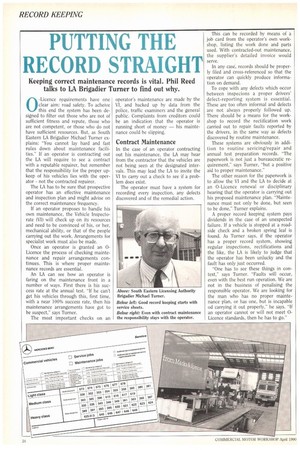PUTTING THE RECORD STRAIGHT
Page 156

If you've noticed an error in this article please click here to report it so we can fix it.
Keeping correct maintenance records is vital. Phil Reed talks to LA Brigadier Turner to find out why.
0-Licence requirements have one clear aim: road safety. To acheive this end the system has been designed to filter out those who are not of sufficient fitness and repute, those who are not competent, or those who do not have sufficient resources. But, as South Eastern LA Brigadier Michael Turner explains: "You cannot lay hard and fast rules down about maintenance facilities." If an operator is contracting out the LA will require to see a contract with a reputable repairer, but remember that the responsibility for the proper upkeep of his vehicles lies with the operator not the contracted repairer.
The LA has to be sure that prospective operator has an effective maintenance and inspection plan and might advise on the correct maintenance frequency.
If an operator proposes to handle his own maintenance, the Vehicle Inspectorate (VI) will check up on its resources and need to be convinced of his, or her, mechanical ability, or that of the people carrying out the work. Arrangements for specialist work must also be made.
Once an operator is granted an 0Licence the process of checking maintenance and repair arrangements continues. This is where proper maintenance records are essential.
An LA can see how an operator is faring on the maintenance front in a number of ways. First there is his success rate at the annual test. "If he can't get his vehicles through this, first time, with a near 100% success rate, then his maintenance arrangements have got to be suspect," says Turner.
The most important checks on an operator's maintenance are made by the VI, and backed up by data from the police, traffic examiners and the general public. Complaints from creditors could be an indication that the operator is running short of money — his maintenance could be slipping.
Contract Maintenance
In the case of an operator contracting out his maintenance, the LA may hear from the contractor that the vehicles are not being seen at the designated intervals. This may lead the IA to invite the Vito carry out a check to see if a problem does exist.
The operator must have a system for recording every inspection, any defects discovered and of the remedial action. This can be recorded by means of a job card from the operator's own workshop, listing the work done and parts used. With contracted-out maintenance, the supplier's detailed invoice would serve.
In any case', records should be properly filed and cross-referenced so that the operator can quickly produce information on demand.
To cope with any defects which occur between inspecions a proper drivers' defect-reporting system is essential. These are too often informal and defects are not always properly followed up. There should be a means for the workshop to record the rectification work carried out to repair faults reported by the drivers, in the same way as defects discovered by routine maintenance.
These systems are obviously in addition to routine sevicingirepair and annual test preparation records. "The paperwork is not just a bureaucratic requirement," says Turner, "but a positive aid to proper maintenance."
The other reason for the paperwork is to allow the VI and the LA to decide at an 0-Licence renewal or disciplinary hearing that the operator is carrying out his proposed maintenance plan. "Maintenance must not only be done, but seen to be done," Turner explains.
A proper record keeping system pays dividends in the case of an unexpected failure. If a vehicle is stopped at a roadside check and a broken spring leaf is found. As Turner says, if the operator has a proper record system, showing regular inspections, rectifications and the like, the LA is likely to judge that the operator has been unlucky and. the fault has only just occurred.
One has to see these things in context," says Turner. "Faults will occur, even with the best run operation. We are not in the business of penalising the responsible operator. We are looking for the man who has no proper maintenance plan, or has one, but is incapable od carrying it out properly," he says. "If an operator cannot or will not meet 0Licence standards, then he has to go.''








































































































































































